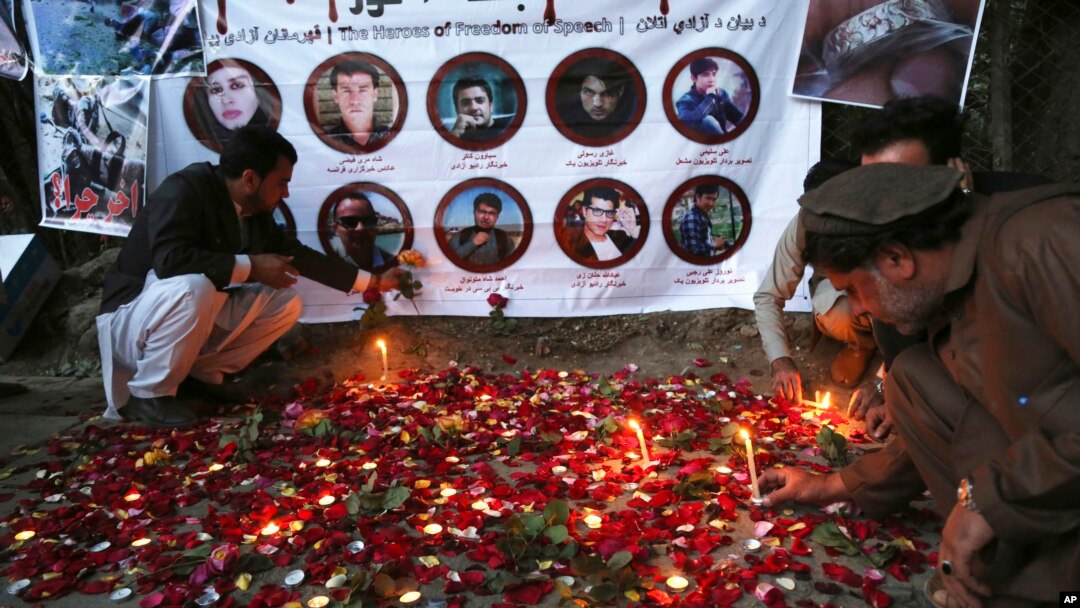At least 63 journalists around the world were killed doing their jobs in 2018, with Afghanistan being the deadliest place for journalists worldwide, Reporters Without Borders (RSF) said Tuesday.
The Paris-based organization, which advocates for freedom of the press around the world, reported violence against reporters rose 15 percent compared to 2017.
If all media workers and citizen journalists who were killed globally were included, the number of fatalities increased to 80.
"The hatred of journalists that is voiced ... by unscrupulous politicians, religious leaders and businessmen has tragic consequences on the ground, and has been reflected in this disturbing increase in violations against journalists," RSF Secretary-General Christophe Deloire said in a statement.
The group said in its annual report that Afghanistan was the world's deadliest country for journalists in 2018, with 15 deaths, followed by Syria with 11 journalists killed in the country this year.
Deadliest country
The increased fatalities among journalists in Afghanistan is due in part to bombings and shootings that targeted media workers.
In April, a double bombing in Kabul killed nine journalists, including six Radio Free Europe reporters.
The Islamic State (IS) terror group claimed responsibility for those attacks, which they said deliberately targeted journalists.
WATCH: Twin Attacks in Kabul
Your browser doesn’t support HTML5
Twin Suicide Attack Kills 26, Wounds More Than 50 in Kabul
Advocacy groups say that extremist groups, such as Taliban and IS, are the biggest threat to journalists in Afghanistan.
"According to our data, these two groups have been responsible for most of [the] journalist casualties. Taliban and IS were responsible for at least 11 of [the] journalists killed [in 2018]," Najib Sharifi, director of Afghan Journalists Safety Committee, told VOA.
"The Afghan government cannot provide security for journalists. Media organizations are also not mature enough to ensure the safety of their journalists," Sharifi said. "We have provided a safety guideline for the protection of journalists, but it has yet to be implemented."
Training
Some analysts echoed that concern, saying journalists in countries like Afghanistan are not well-trained to protect themselves on the job.
"Unfortunately, lack of skills [for protection] is one of the big challenges that journalists always face," Hamidullah Zazai, managing director of Mediothek Afghanistan, a group that promotes peace and democracy in the country, told VOA.
Zazai added that mafia and warlords, who are part of the political system in Afghanistan, could also be a threat to "the safety of journalists."
Syria
The RSF report said 11 journalists and media activists were killed in Syria in 2018.
Despite a decline in the number of deaths in the war-torn country, journalists continue to take greater risks to cover the war that has claimed the lives of hundreds of thousands of people and displaced millions of others.
FILE - Mourners weep over the coffin of a Syrian journalist killed by the Islamic State militants on the frontline in Deir al-Zour, during a funeral in Kobani, Syria, Oct. 14, 2017.
Redwan Bezar, a 33-year-old Syrian reporter, survived two attacks in 2017 while covering the battle to liberate the Syrian city of Raqqa — the former de facto capital of the IS terror group.
"Since those attacks, every time I leave my house to cover something in Raqqa or elsewhere, I feel it would be my last time," Bezar told VOA.
In both incidents, Bezar said he and his crew were targeted by IS suicide attacks.
"The environment we work in is very hazardous. Warring sides don't respect journalists and their works," he said. "In addition to killing, many journalists have also been subject to abduction and arrest."
Since the start of the Syrian civil war in 2011, more than 200 journalists covering the conflict have been killed, including three American reporters, according to RSF.
War zones
Siruan Hadsch Hossein, executive director of Arta for Media and Development, a Syrian organization that is partially funded by a U.S. government program, said there should be more efforts by international groups to protect journalists in war zones like Syria.
"More resources should be available to local journalists in Syria, where journalists have played an important role in reporting on what's really happening in this devastating and complex war," Hossein told VOA.
The Committee to Protect Journalists (CPJ), a New York-based group that advocates for journalists' rights, also tracks causalities among journalists in conflict zones around the world.
"It's very challenging to protect journalists who work in conflict zones with many state and nonstate actors who are killing journalists," Courtney Radsch, advocacy director at CPJ, told VOA.
"But I do think that by providing safety guidance and by ensuring that journalists understand the steps that they can at least take to keep themselves safe, knowing the risks, that can help somewhat," Radsch said.
VOA's Afghanistan Service has contributed to this story.


